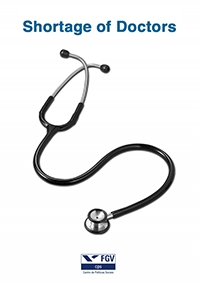
Shortage of Doctors
About the research:
In spite of the relatively high mean ratio of doctors per inhabitant, this research showed that Medicine professionals are very scarce in the Brazilian labor market. Doctors lead a “scarcity ranking” among all professions linked to a University degree according to labor indicators developed in this project, such as occupation rate, earnings and working hours. We present data on the recent evolution of Brazilian doctors in terms of their availability and labor performance, in addition to rankings that illustrate the number of doctors per inhabitant between countries, Brazilian states and municipalities. The research demonstrates that the unbalanced spatial distribution of doctors is not only observed at states’ level but also within each one of them. Brazilian states such as Rio de Janeiro and Espírito Santo, for example, encompass municipalities with either the highest or the lowest number of doctors per inhabitant, including those doctors who decided to migrate after finishing their studies. Thus, the research addresses the debate concerning the federal initiative of enlarging the permanent amount of doctors in each macro-region of the country based on incentives to be given to new graduates in Federal Universities. It also addresses the patients’ perspective by focusing on the migration movements between municipalities related to their demand for health services. The research gives special attention to diseases’ impacts on the subjective and objective well-being of the patients. We analyzed the access to health services and their quality. The results show that the poorest segment of the population is not only more prone to get sick, but also the group that is negatively impacted the most from an illness, given their lack of access to preventive policies, consequently demanding hospital services more frequently. Household budget surveys allow us to estimate the effects of “health shocks” on the family’s finances. In addition to the main analysis text in Portuguese, the research offers interactive and user-friendly data sets to be used by the citizens, which contain first-hand information and products such as tables, simulators based on statistical models, maps and rankings for Brazilian municipalities. The research website allows any individual to obtain his/her own conclusions with respect to the extension, the causes and the consequences of the lack of health services and doctors in his/her own locality.




